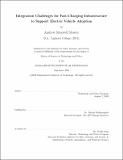| dc.contributor.advisor | Dharik Mallapragada. | en_US |
| dc.contributor.author | Mowry, Andrew Maxwell. | en_US |
| dc.contributor.other | Massachusetts Institute of Technology. Institute for Data, Systems, and Society. | en_US |
| dc.contributor.other | Technology and Policy Program. | en_US |
| dc.date.accessioned | 2021-01-06T17:41:37Z | |
| dc.date.available | 2021-01-06T17:41:37Z | |
| dc.date.copyright | 2020 | en_US |
| dc.date.issued | 2020 | en_US |
| dc.identifier.uri | https://hdl.handle.net/1721.1/129127 | |
| dc.description | Thesis: S.M. in Technology and Policy, Massachusetts Institute of Technology, School of Engineering, Institute for Data, Systems, and Society, Technology and Policy Program, September, 2020 | en_US |
| dc.description | Cataloged from student-submitted PDF version of thesis. | en_US |
| dc.description | Includes bibliographical references (pages 59-64). | en_US |
| dc.description.abstract | Highway fast-charging stations located between major population centers are necessary to address consumer charging concerns and thus to support the continued adoption of electric vehicles to meet decarbonization policy targets. Yet such stations, if sized to support anticipated demand, may cause operational difficulties on the power grid. Using a spatially resolved model of the power transmission network and a detailed market simulator, we characterize the effects of large-scale EV fast-charging on the Texas ERCOT system. We further explore three strategies to mitigate these effects -- energy storage colocation, network reinforcement, and demand flexibility -- | en_US |
| dc.description.abstract | and quantify their costs. This analysis is unique in its focus on highway fast-charging, in its nodal representation of the power grid, and in its measurement of transmission-level impacts. We find that highway fast-charging stations do have the potential to cause transmissionlevel impacts, especially by exacerbating local transmission constraints. Inter-zonal transfer constraints and increased costs due to the dispatching of more expensive generation also contribute to system costs. We develop a general method to identify the most impactful charging stations, but we find that the determination of cost-effective mitigation strategies for each station requires a more tailored approach. Our analysis indicates that transmission reinforcement and battery co-location are relatively competitive mitigation strategies, but that demand flexibility is not. | en_US |
| dc.description.abstract | When considering policies to promote fast-charger development, policymakers should focus on involving multiple stakeholders who can contribute different expertise to identify costefficient solutions. Specifically, we suggest a central role for power utilities due to their experience planning transmission reinforcement, but we also highlight an important role for private developers, especially in the United States, for political feasibility and overall cost controls. | en_US |
| dc.description.statementofresponsibility | by Andrew Maxwell Mowry. | en_US |
| dc.format.extent | iv, 70 pages | en_US |
| dc.language.iso | eng | en_US |
| dc.publisher | Massachusetts Institute of Technology | en_US |
| dc.rights | MIT theses may be protected by copyright. Please reuse MIT thesis content according to the MIT Libraries Permissions Policy, which is available through the URL provided. | en_US |
| dc.rights.uri | http://dspace.mit.edu/handle/1721.1/7582 | en_US |
| dc.subject | Institute for Data, Systems, and Society. | en_US |
| dc.subject | Technology and Policy Program. | en_US |
| dc.title | Integration challenges for fast-charging infrastructure to support electric vehicle adoption | en_US |
| dc.type | Thesis | en_US |
| dc.description.degree | S.M. in Technology and Policy | en_US |
| dc.contributor.department | Massachusetts Institute of Technology. Institute for Data, Systems, and Society | en_US |
| dc.contributor.department | Technology and Policy Program | en_US |
| dc.contributor.department | Massachusetts Institute of Technology. Engineering Systems Division | |
| dc.identifier.oclc | 1227199229 | en_US |
| dc.description.collection | S.M.inTechnologyandPolicy Massachusetts Institute of Technology, School of Engineering, Institute for Data, Systems, and Society, Technology and Policy Program | en_US |
| dspace.imported | 2021-01-06T17:41:36Z | en_US |
| mit.thesis.degree | Master | en_US |
| mit.thesis.department | TPP | en_US |
| mit.thesis.department | ESD | en_US |
| mit.thesis.department | IDSS | en_US |
